In Case of Emergency
Rice EMS celebrates 25 years of lifesaving service inside the hedges and beyond.
By Brandon Martin and Schaefer Edwards '13 | Photos by Jeff Fitlow
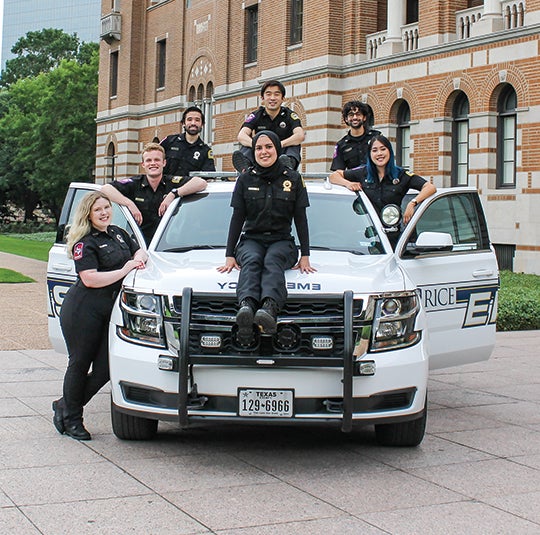
Wiess College senior Leenah Abojaib was thrilled as she walked into Esther Fernández’s Women and Gender in Spanish Culture class in mid-October. Abojaib was ready and eager to talk all things “Julieta,” a movie about a mother trying to reunite with her long-lost daughter. “I was so looking forward to the discussion. I did my lecture work — I did everything — I was ready,” she said. But 10 minutes into a lively chat about the acclaimed film from director Pedro Almodóvar, an unmistakable siren started blaring as all eyes turned to Abojaib, clad in her black Rice Emergency Medical Services (REMS) uniform. The REMS captain rustled through her bag to find her radio and cellphone, both devices ding-ding-dinging in unison.
“I scrambled to put my computer back, took the phone out to check where the call was, indicated that I was en route using the radio and then ran out to the [EMS] truck,” Abojaib said. A pre-med student, Abojaib rushed to the aid of a woman in cardiac distress. In a serendipitous twist, the woman in need only spoke Spanish.
“I told my professor afterward, ‘I’m so sorry I missed your class, but at least what we learned in class really benefited that patient!’”
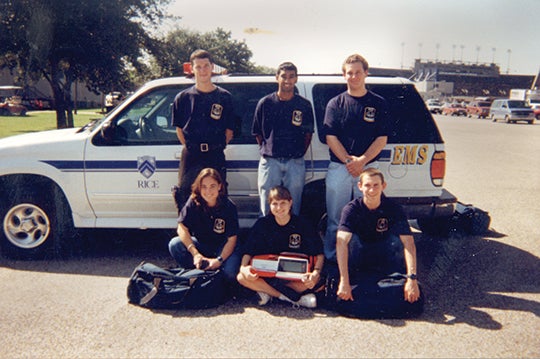
Owls to the Rescue
October 2021 marked the 25th anniversary of REMS, the university’s student-led team of emergency medical technicians that’s blossomed into a lifesaving point of pride for Rice and has minted countless campus leaders — Abojaib included — since its inception in 1996. Today, Rice offers two levels of emergency medical technician (EMT) courses — basic and advanced — for medically minded students and would-be REMS team members. The group’s student EMTs regularly respond to emergencies on campus, routinely assist with emergency medical calls across Harris County and have become a constant, comforting presence focused on putting Rice’s culture of care into action.
According to Lisa Basgall, REMS’ director for the past 12 years, REMS is currently composed of 54 undergraduate EMTs, 25 part-time staffers and two licensed EMS physicians.
“We work hard to be qualified, empathetic and professional patient-care providers. We want to have the public’s trust that we’re going to respond consistently and be able to help them when they have an emergency,” Basgall said. “And after 25 years, hopefully, we have a solid foundation.”
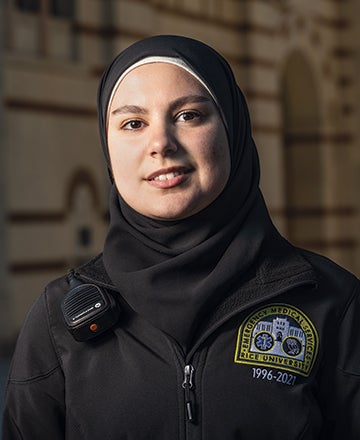
Today, REMS is one of over 250 student-run EMS organizations operating across the country, according to the National Collegiate Emergency Medical Services Foundation. To Cameron Decker ’07, current REMS chief medical director and medical director of the Harris County Emergency Corps, the fundamental difference between REMS and other campus organizations are the high-stakes decisions students often make and a level of responsibility that helps REMS members “grow up pretty darn quickly.”
“The day to day is going to be responding to emergencies that are not as time sensitive and critical in nature,” Decker said. “But there certainly are those emergencies in which lives are truly at stake, and our students — our membership — are taking care of our own community in their time of need.”
An Emergency Startup
REMS is so well-established now that it’s hard to imagine a time when there wasn’t a dependable student medical corps on campus. But co-founder Mark Escott ’96 said getting REMS off the ground was an uphill battle.
“[I] got a whole lot of noes from lots of different people, primarily due to concerns about the need and the risk involved,” said Escott, now the chief medical officer for the city of Austin. “The perception is and was at the time that Rice was located across the street from the largest medical center in the world — why would we need to have first response [if] ambulances are coming from across the street?”
We work hard to be qualified, empathetic and professional patient-care providers. We want to have the public’s trust that we’re going to respond consistently and be able to help them when they have an emergency. — Lisa Basgall
But Escott and his twin brother, Mike Escott ’98, knew firsthand from their time working as student paramedics on ambulances in north Harris County that proximity to the Texas Medical Center didn’t always translate into quick response times. “Being an insider into EMS systems, I knew that was not the case,” Mark said. “They were coming from stations all around town, and anecdotally, it was taking a long time for ambulances to get here, which means a large gap between when the person needs help.”
Undeterred, the Escotts and a group of fellow students kept at it and were eventually able to secure the funding to get REMS up and running by October 1996. The timing could not have been better. “I think the first week that we were in service, we had somebody collapse at Cohen House. One of our EMTs was serving as a waitress there and started CPR immediately [and] saved the person,” Mark said.
“That happened to be in front of a Houston City Council member, so it brought a lot of positive attention to the program,” he said. “A month later, we had an individual collapse at one of the galas the president was hosting, which had a REMS response and a successful outcome. So two successes shortly after the program began really helped to solidify the program for the future.”
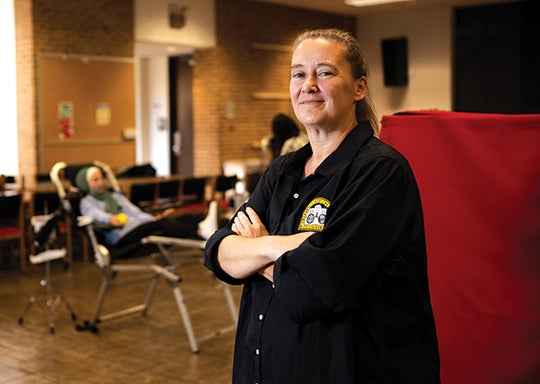
Training and 24-Hour Shifts
These days, in addition to mandatory monthly training sessions, REMS’ rank-and-file “duty crew” EMTs are required to take on at least two 12-hour shifts per month from 8 a.m. to 8 p.m. or vice versa. “Incharges,” REMS lingo for its student leadership team led by current captain Abojaib and multiple lieutenants, share the load of 24-hour shifts to make sure a seasoned REMS veteran is always on call year-round. (The exception is the 10–12 days around Christmas and the new year when REMS takes a temporary break.) Currently, REMS has more applicants each semester than it can accept into its ranks, Basgall said.
Timothy Hays, a McMurtry College sophomore and REMS duty crew member who worked his first official shifts this past summer, is proud to be part of the next generation of REMS members. “We just have a bunch of really hardworking people who came before us. [It’s amazing] when I hear about how REMS started: How from nothing, some college students just created this emergency medical service for the university and had that actually be successful and grow to this point,” Hays said.
[It’s amazing] when I hear about how REMS started: How from nothing, some college students just created this emergency medical service for the university and had that actually be successful and grow to this point. — Timothy Hays
It’s one thing to commit your time to service when you have plenty to spare, but REMS EMTs squeeze their shift commitments into already packed academic and even athletic schedules. Abojaib said she typically takes five 24-hour shifts per month, all while double majoring with a 15-hour course load and teaching her own student-led class on crocheting during the fall semester. Hays fits his REMS shifts in around an 18-hour class schedule and his hours of practice and training with the men’s cross-country team.
When his friends find out he’s an EMT, Hays said that “a lot of them ask, ‘How do you have time for this?’ Or, ‘How does this work with classes?’” Often, he has to dispel the common misconception that REMS EMTs can’t sleep during overnight shifts — that’s what the radio siren is for. He did confirm he’s had to turn down more than a few invitations for late-night shindigs with his fellow students, though.
A Lifetime of Lessons
Former REMS EMTs will tell you that all the missed parties and the stress of hours spent on call were small prices to pay for the invaluable lessons they have learned through the program. Zack Timmons ’15 said his time as a REMS EMT set him up well for his current career as an emergency medicine resident physician at the University of Texas Health Science Center at Houston. “I had such a good experience with the Rice EMT basic course and ultimately the EMT advanced course at Rice. [I got] to apply some of the science I was learning in the classroom to problems that real people were facing on campus,” Timmons said. “But the thing that brings people into REMS is really the service aspect, and I think that’s something that’s stuck with me since then and throughout my whole career.”
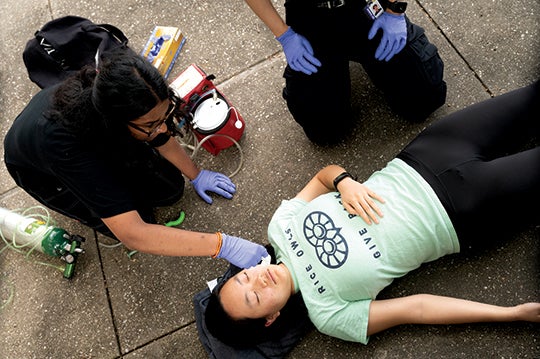
Similarly, Malford Tyson Pillow ’02, associate professor of emergency medicine and vice chair of education in emergency medicine at Baylor College of Medicine, credits his time as a REMS EMT with teaching him how to be an empathetic leader in times of crisis. “One of the quotes I love to use — I believe it’s Maya Angelou’s — says something to the effect of ‘people won’t always remember what you say or what you did, but they’ll always remember how you made them feel.’ I remember being there to help students out at their worst moments ... and then seeing them later at lunch or in a class and them saying ‘thank you.’”
“It opened up so many different doors,” said Abigail Tucker ’19, a former advanced EMT at Rice who served as REMS captain during her senior year. “It made me a better communicator, a better listener, better [at] working with others — skills that I’ll have for the rest of my life. It just opened my eyes to medicine and to how to serve the community.”
The broad impact is in a foundation of leadership and creating leaders,” he said. “I think that REMS does a fantastic job of rapidly bringing its leadership into adulthood. — Cameron Decker '07
Those lessons on the value of service extend far beyond the medical world; Timmons was quick to point out how the leadership and communications skills he gained as a student EMT benefited him during his nearly two-year stint as a business analyst at Deloitte. His work in emergency medicine also raised his awareness about how a lack of healthy eating options affected so many of the patients he cared for both as a REMS EMT and later as a student at the University of Texas at Austin’s Dell Medical School. Together, these experiences inspired Timmons to co-found Good Apple, an Austin-based produce delivery company that uses its profits to deliver boxes of fresh food to families facing food insecurity in Central Texas.
Decker figures that’s what REMS is all about. “The broad impact is in a foundation of leadership and creating leaders,” he said. “I think that REMS does a fantastic job of rapidly bringing its leadership into adulthood.” Looking back on the past quarter century of REMS, Mark Escott agreed that watching its members grow into confident care providers and service-minded leaders has been very rewarding. “I think one of the things that has been most surprising to me is the leadership lessons people have taken away from the program that they’ve used in their careers, be it medicine or something else,” Escott said.
Abojaib, who’s originally from Syria and grew up in Saudi Arabia before moving to Minnesota in 2016, said REMS opened her eyes to the possibility that she too could lead her fellow students. “I never thought that I could be a captain, lieutenant or incharge because [I am] someone who has a very different background. One thing I did have from the moment of coming to Rice is not being afraid to try out for opportunities and see what things happen,” she said. “I definitely can see a tangible difference between when I first started and now. And I know that other people … were involved in that growth, and I wanted to be someone like that for somebody else.”
Growing a Legacy
Looking ahead toward the next 25 years of REMS, Basgall knows there are plenty of opportunities for the program to evolve. She credits the organization’s close partnerships with the Rice University Police Department, Facilities Engineering and Planning, and Housing and Dining as well as with the residential college magisters and presidents who support their student EMTs with helping REMS excel over the years.
“We want to continue to grow. We want to continue to have clinical opportunities for our students. At 25 now, our alumni network continues to grow, and we have alumni who have amazing experiences in high-stakes and different institutions around the country,” Basgall said, with an eye toward expanding that network in the years ahead.
REMS members might demur when they’re called “superheroes,” but that’s just the type of humility you’d expect from your friendly neighborhood lifesavers who are so willing to give up many hours of their precious college years to make their community a safer place. “The commitment that they give and the talent that they bring, their willingness to figure out teamwork … it’s just amazing,” Basgall said.
